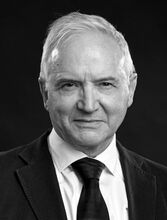ESWI Symposium: RSV Looking towards the future
Peter Openshaw, Stefania Maggi
Chairs

Nationality: British
Position: Respiratory physician and mucosal immunologist, Professor of Experimental Medicine, Imperial College, London.
Research fields: Lung immunology, RSV, received a lifetime achievement in work on RSV research (Chanock prize, US, in 2012).
ESWI member since 2008
Peter Openshaw MD PhD CBE is Professor of Experimental Medicine at Imperial College London, UK. A respiratory physician and mucosal immunologist, his research focuses on how the immune response both protects against viral infection but also causes disease.
He has published widely on vaccinology, the immunopathogenesis of pulmonary viral diseases and lung inflammation. He is especially known for his work on respiratory syncytial virus (RSV), influenza and COVID-19, and for the development of human challenge in volunteers. He has co-authored over 400 publications and has an h-index of 105 (Google Scholar accessed Aug 2024). See also: https://orcid.org/0000-0002-7220-2555.
He was the first clinical President of the British Society for Immunology (2013-18) and served on many grant committees and Advisory Boards, becoming an Honorary Lifetime Member of the British Society for Immunology (2019). He has received prizes for his lifetime contribution to RSV research (Chanock Award, 2012), the European Federation of Immunological Societies Award (2014) and the Per Brandtzaeg Distinguished Scientific Achievement Award in mucosal immunology (2024).
He has built strong connections with journalists in print, radio and TV and used social media to promote accurate reporting of science stories, especially in relation to vaccines and respiratory disease. For example, he appeared over 100 times on national and international TV and radio between March 2021 and March 2022, explaining the complexities behind the COVID-19 pandemic response.
He advised the UK government on pandemics (SAGE, 2009-12; Chair/Vice-Chair of NERVTAG, 2015-2022). He was made a Commander of the British Empire for services to Medicine and Immunology in the 2022 UK New Year’s Honours and received the 2024 Imperial College Medal for his work as a Consul, supporting the development of the university’s Ethos, Values and Behaviours (Respect, Collaboration, Excellence, Integrity and Innovation).

Nationality: Italian
Position: Research Director, CNR Ageing Branch, Neuroscience Institute, Padova (Italy)
Research Fields: Clinical epidemiology and geriatrics. Main focus on lifelong approach to healthy ageing
ESWI member since 2022
Dr. Stefania Maggi received her degree in Medicine and Surgery from the University of Padua, Italy in 1983. She also attended the Graduate School of Geriatrics and Gerontology from the same University until 1987 and in 1988 she received her Master in Public Health from John Hopkins University in Baltimore (USA). Dr. Maggi also holds a PhD in Clinical Pathophysiology from the University of Padua, which she received in 2000.
Dr. Maggi has a specific interest in the epidemiology of ageing and in the analysis of factors promoting health ageing in a lifelong approach. From 1983-1985, Dr. Maggi worked as an attending physician at the Internal Medicine Department for the University Hospital in Padua before she spent the years of 1988-1989 as a postdoctoral fellow at the National Institute of Arthritis and Musculoskeletal and Skin Diseases (NIAMS), for the National Institute of Health (NIH) in Bethesda, Maryland (USA). From 1989-1993, she worked as the Coordinator for the WHO Program on Ageing, before she moved on to work as a researcher in the Ageing branch at the Institute of Neuroscience, Consiglio Nazionale Delle Ricerche (CNR), Padua. Dr. Maggi worked as a researcher from 1993-2007 before becoming Research Director for the same branch and institute, in 2007, a position she currently holds. In this position, she coordinates several national and international research projects on nutrition, vaccines and lifestyle as key factors for promoting healthy ageing. Dr. Maggi is also an Adjunct Professor in the Graduate Schools of Geriatric Medicine at the University of Padua, which she has been since 2000.
Moreover, Dr. Maggi is the Editor in Chief of “Ageing Clinical and Experimental Research” (Springer) and has more than 800 publications, both in peer-reviewed journals and many book chapters.

